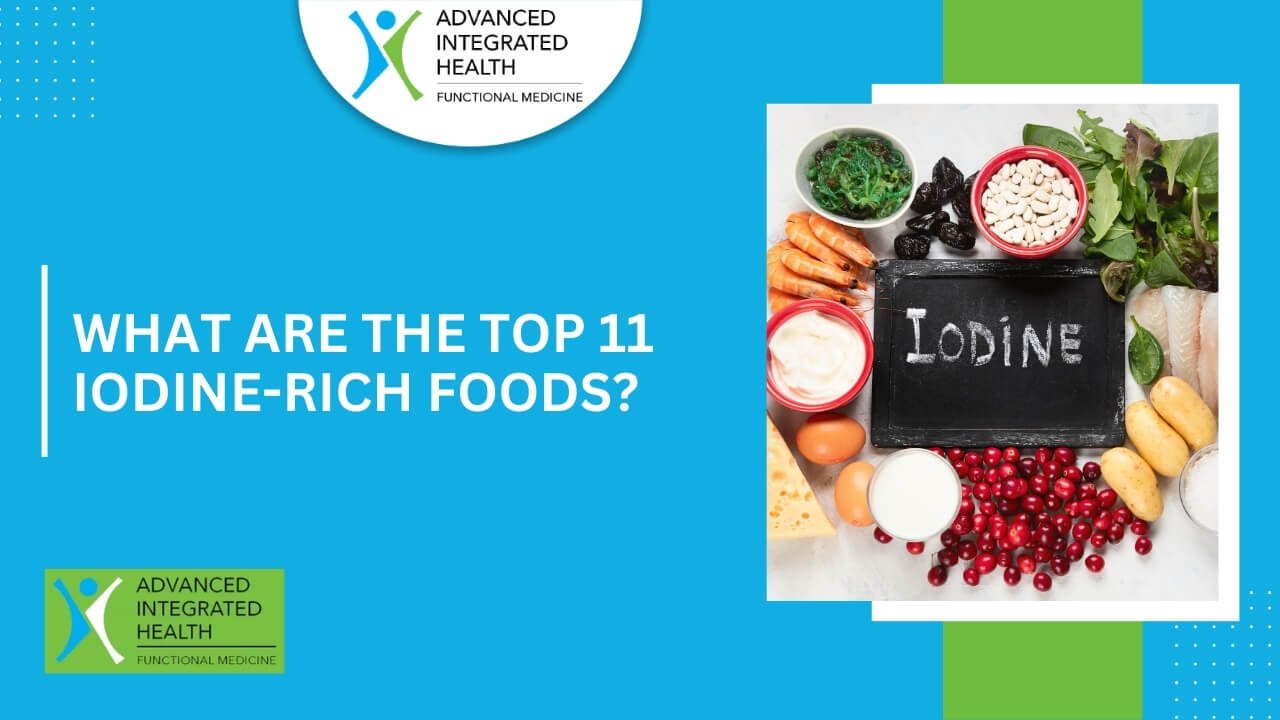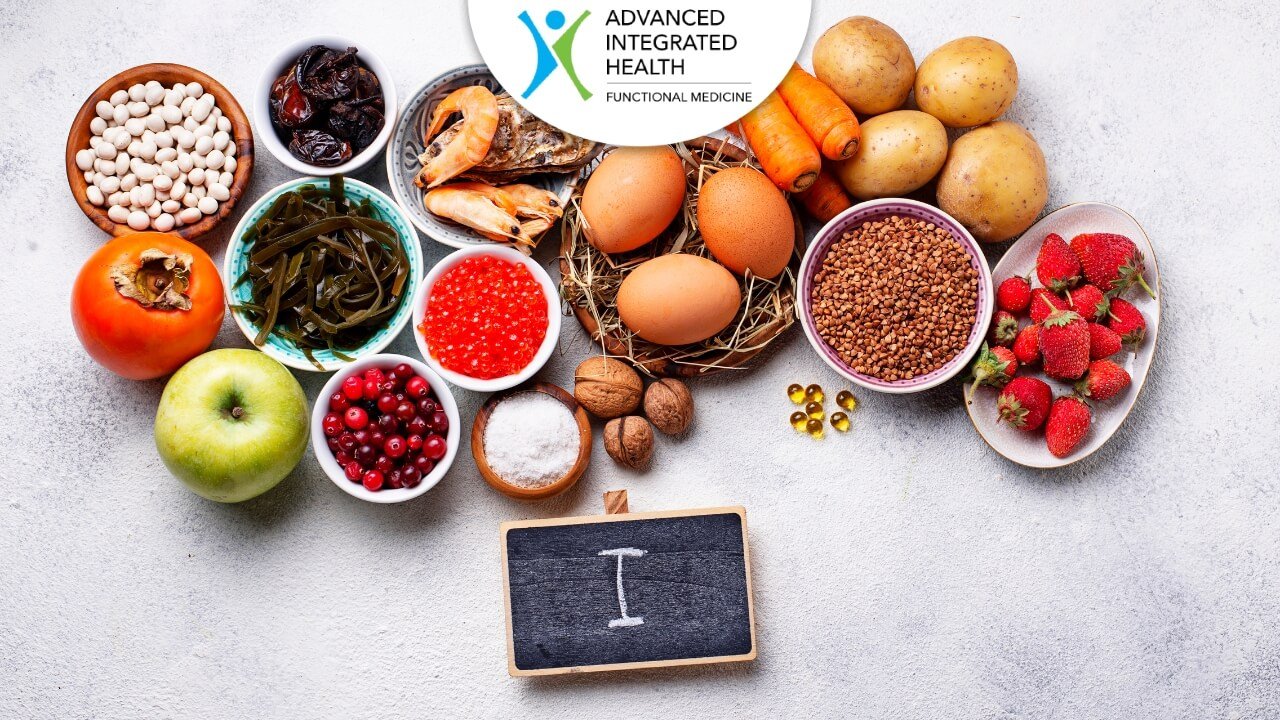What comes to mind when you hear the words ‘essential micronutrients?’ Most people think of examples like calcium, vitamin D, B vitamins, iron, and vitamin A. But what about iodine? It’s a trace mineral and essential micronutrient that your body needs to function.
But despite its importance, a third of the world’s population is at risk of experiencing an iodine deficiency. Because it plays an important role in several brain and hormone functions, it’s worth taking a look at why your body needs iodine, the signs of deficiency, and foods that are rich in iodine.
Why Your Body Needs Iodine
You need a steady iodine intake through your diet because, unlike vitamin D, your body can’t produce iodine on its own. It’s essential for your thyroid gland and thyroid hormone production. Currently, the minimum intake requirement is 150 micrograms for an adult. Pregnant and lactating women require a minimum intake of 220 and 290 micrograms, respectively.
The Thyroid Gland And Thyroid Hormones
Your thyroid gland derives iodine from food to make thyroid hormones thyroxine and triiodothyronine, which are considered to be the inactive and active form of thyroid hormone. The thyroid gland regulates your body’s growth, development, and metabolic rate. It also slows down and speeds up your heart rate, raises and lowers your body temperature, and affects digestion. Without it, you could face a deficiency that impairs brain development, muscle function, and various other functions.
Signs Of Iodine Deficiency
When your body doesn’t get enough iodine, it leads to inadequate thyroid hormone production. You’ll start showing signs of hypothyroidism or experience abnormal enlargement of your thyroid gland, also known as a goiter. Here are common signs and symptoms that people experience due to low iodine levels:
- Weakness and fatigue
- Swelling in the neck
- Sensitive to the cold
- Dry skin
- Hair loss
Women may experience symptoms like heavy or irregular periods due to an iodine deficiency because low thyroid hormone levels can affect other hormones involved in the menstrual cycle. A low-iodine diet can also contribute to issues during pregnancy and lactation. For instance, stunted brain development in infants and fatigue in mothers.
Meanwhile, a severe iodine deficiency can lead to an abnormally slow heart rate, making you feel dizzy, fatigued, and weak. It can also cause the development of a goiter, significant weight gain, and excessive muscle weakness. Though many cases of hypothyroidism go undetected, high levels of thyroid-stimulating hormone (TSH) are an early indicator of hypothyroidism.
If you want expert guidance on iodine deficiency from a medical professional, consider scheduling an online functional medicine session with Advanced Integrated Health. You can speak with a functional medicine specialist to learn about common symptoms of iodine deficiency.
Foods Rich in Iodine
Now that we’ve gone over how much iodine you need and why you need it, it’s time to talk about foods that contain this essential mineral. Here are 11 foods rich in iodine that can help you prevent a deficiency, according to the National Institute of Health:
Enriched Bread
Enriched whole wheat and white bread top the list as the foods with the highest iodine levels. Two slices of enriched white bread made using iodate dough conditioners contain 296 micrograms per serving, while whole wheat bread contains 273. That’s 197 and 182 percent of your daily value, respectively. Though your average sliced bread likely won’t contain as much iodine, enriched bread is different. This is thanks to compounds like calcium iodate and potassium iodate, which are added to bread as dough conditioners.
Conditioning the dough improves its strength and elasticity, ensuring a better texture and volume. It’s especially useful for commercial baking, where consistent rise is essential. These compounds also improve iodine nutrition because adding it to bread makes it a convenient method of iodine supplementation.
Cod
Three ounces of baked cod contains 146 mcg of iodine, making up about 97 percent of your daily value. Though most types of seafood are great sources of iodine, cod is especially healthy because of its ability to retain more of the essential mineral. It meets your daily minimum, and its subtle taste means you can prepare it in different ways to meet your tastes.
Seaweed
Seaweed varieties, like nori seaweed, contain high levels of iodine. 5 grams contains 116 mcg of iodine, making up about 77 percent of your daily minimum intake. Seaweed is exceptionally rich in iodine because it absorbs minerals from its surrounding environment in the ocean, which naturally has high levels of essential minerals. This leads to much higher concentrations that make it easier to meet your daily iodine intake.
Oysters
Three ounces of cooked oysters contain 93 mcg of iodine, which is about 62 percent of your daily minimum requirement. Though they don’t contain as much iodine as seaweed or cod, they’re still a good way to supplement your diet with iodine.
Oysters are filter feeders, so they take in large amounts of seawater, filtering out plankton and other nutrients. This allows them to absorb iodine directly from the water and accumulate it in their tissues. Plus, they usually live in habitats like coastal areas and estuaries, where the seawater naturally contains high levels of iodine.
Greek Yogurt
Besides seafood, adding dairy products to your diet can help ensure adequate iodine intake. 3/4 of a cup of plain, nonfat Greek yogurt contains 87 mcg of iodine, which is 58 percent of your daily minimum requirement. Of course, iodine levels in your yogurt can depend on the milk used in its production.
It’s common for dairy cows to be fed a diet that’s supplemented with iodine. Not to mention, greek yogurt is concentrated by straining regular yogurt, so it retains more nutrients and gives you more iodine per serving.
Nonfat Cow’s Milk
If you can’t get your hands on some Greek yogurt, try nonfat cow’s milk instead. It’s rich in iodine, sometimes even more so than whole milk. One cup gives you 84 mcg of iodine and makes up about 56 percent of the daily minimum value, which is pretty close to that of Greek yogurt. Compared to whole milk, nonfat milk goes through different processes that concentrate its nutritional levels, making it a great source of iodine.
Iodized Salt
Next up, we have the most easily accessible source of dietary iodine: iodized salt. Compared to other types of table salt, like Himalayan salt and kosher salt, it’s fortified with the essential minerals to help meet daily intake requirements. One-quarter of a teaspoon contains 78 mcg of iodine and makes up about 52 percent of the daily minimum. The FDA approved the use of potassium iodide to fortify salt with iodine – it’s how people in the US get most of their dietary iodine.
Several regions have iodized salt programs to counter the risk of mild moderate iodine deficiency in the population. However, because medical professionals recommend reducing overall salt intake for health reasons, you can’t rely on iodized salt to meet your daily requirements. That being said, people who don’t use iodized salt have a higher risk of developing a deficiency if they don’t eat enough foods that contain iodine. So, it’s best to use iodine-fortified salt whenever you’re preparing food.
Eggs
While they aren’t as fortified as some seafood and dairy sources, eggs contain a fair amount of iodine. One large hard-boiled egg contains 31 mcg of iodine, about 21 percent of the daily minimum requirement.
Just remember that most of the nutritional value in eggs is found in the yolk, so if you only eat egg whites, it won’t help much. Also, how you cook the eggs can affect how much iodine they contain. To make sure you’re making the most of its iodine content, it’s best to hard-boil them.
Cheese
If you have a mild iodine deficiency and want to start adding iodine-rich foods to your diet, dairy products are a good place to start. One ounce of cheddar cheese has 14 mcg of iodine, which makes up 9 percent of your daily minimum requirement. As long as you’re combining cheese with other sources of iodine, you can ensure steady thyroid function without risks of a deficiency.
Beef Liver
Three ounces of cooked beef liver contains 14 mcg of iodine, which makes up about 9 percent of the recommended daily amount. Just like milk, beef cattle consume iodine through their feed, some of which is stored in their tissues. Since beef liver isn’t as iodine-dense as dairy or seafood products, it’s a good idea to include foods in your diet to address your deficiency.
Shrimp
Three ounces of cooked shrimp has 13 mcg of iodine, which is about 9 percent of your recommended daily amount. Unlike other types of seafood like seaweed, cod, and oysters, shrimp doesn’t have a lot of iodine. That’s because shrimp live in coastal waters, which may have lower levels of iodine. They also can’t store the mineral as efficiently as bigger fish.
Other Sources: Iodine Supplements
Besides food, you can also try taking an iodine supplement to prevent the risk of symptoms like weight gain, fatigue, and muscle weakness. Just remember to talk to your doctor about the risks of taking supplements. In most dietary supplements, iodine is present in the form of sodium iodide or potassium iodide. According to the results of one small study, the human body can absorb potassium iodide almost entirely. You can also find supplements containing kelp, a seaweed rich in iodine.
You can also find multivitamin and mineral supplements that contain iodine, while some prenatal supplements have iodine as well. It’s best to speak with a professional about whether you should take a multivitamin with iodine or dietary supplements containing only iodine.
Want to know more about iodine supplements? Schedule an online functional medicine session with one of our experts at Advanced Integrated Health.
Are You At Risk of Iodine Deficiency?
You may be at risk of iodine deficiency if you:
- Don’t use iodized salt
- Are pregnant or lactating
- Are vegan (most foods containing iodine are animal foods)
- Live in regions with low iodine levels in the soil.
If you’re worried about your iodine status and whether you’re getting sufficient iodine through your diet, it’s best to speak with an expert.
Can You Have Too Much Iodine?
Yes, it’s possible to have too much iodine, though high intakes are usually well-tolerated in most people and don’t cause issues.
Researchers have observed this in countries like South Korea and Japan, where Iodine-rich seaweed is a staple part of the diet. However, in cases involving people with autoimmune thyroid disease or chronic iodine deficiency, people can be sensitive to excess iodine intake.
Problems Associated With Excessive Iodine Intake
Having too much iodine can also result in additional thyroid hormone production, leading to hyperthyroidism. Signs of this include increased metabolism that triggers weight loss, an irregular or fast heartbeat, fatigue, hand tremors, and sweatiness. Sometimes, the slightest increase in iodine levels above the recommended daily amount can lead to iodine-induced hyperthyroidism in sensitive individuals.
Some studies indicate that a higher intake of seaweed is associated with a higher risk of some forms of thyroid cancer, though researchers have yet to understand the mechanism by which it occurs.
Excessive iodine intake can occur due to high-dose supplements or overeating certain salts and seaweeds containing iodine. Though iodine toxicity is rare, it can lead to symptoms like nausea, vomiting, stomach pain, and a burning sensation in the throat.
Book An Appointment With Advanced Integrated Health
Not eating enough seafood or dairy products can make you iodine deficient and cause symptoms like fatigue, weight gain, and concentration problems. Iodine is an essential mineral that’s needed for the production of thyroid hormone. Adding iodine-rich foods to your diet is the best way to prevent a deficiency. Some examples include enriched bread, seaweed, nonfat milk, cod, and, most importantly, iodized salt.
Though it occurs rarely, it’s possible for your body to have adverse reactions to consuming excess iodine, like iodine-induced hyperthyroidism. If you’re worried about being at risk of an iodine deficiency, it’s best to speak with a professional. At Advanced Integrated Health, we provide holistic, functional care that improves overall wellness. Get in touch with us today to schedule a consultation with one of our functional wellness experts.
Citations
- Office of Dietary Supplements – iodine. (n.d.). https://ods.od.nih.gov/factsheets/Iodine-Consumer/
- Leung, A., Pearce, E. N., & Braverman, L. E. (2010). Role of iodine in thyroid physiology. Expert Review of Endocrinology & Metabolism, 5(4), 593–602. https://doi.org/10.1586/eem.10.40
- Bioavailability of seaweed iodine in human beings. (2002, July 1). PubMed. https://pubmed.ncbi.nlm.nih.gov/12146713/
- Medicine, I. O. (2001). Dietary reference intakes for vitamin A, vitamin K, arsenic, boron, chromium, copper, iodine, iron, manganese, molybdenum, nickel, silicon, vanadium, and zinc. In National Academies Press eBooks. https://doi.org/10.17226/10026
- Murai, U., Yamagishi, K., Kishida, R., & Iso, H. (2020). Impact of seaweed intake on health. European Journal of Clinical Nutrition, 75(6), 877–889. https://doi.org/10.1038/s41430-020-00739-8
- Farebrother, J., Zimmermann, M. B., & Andersson, M. (2019). Excess iodine intake: sources, assessment, and effects on thyroid function. Annals of the New York Academy of Sciences, 1446(1), 44–65. https://doi.org/10.1111/nyas.14041

Dr. Bob was born and raised in Florham Park, New Jersey.
He loved the philosophy of vitalism, which teaches about the incredible, innate intelligence of our bodies and its power to self-heal when given the opportunity.



